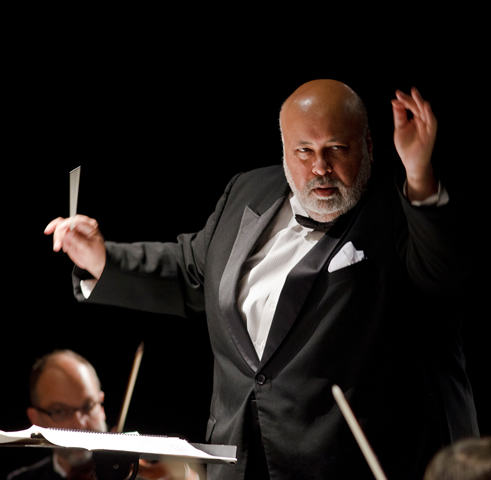The North Carolina Symphony opened its 2014-15 Wilmington season with a performance titled “At the Oscars©.” The concert, at Kenan Auditorium on the UNCW campus, was devoted to music for film, and many of the films have indeed won Oscars©.
The opening music was the introduction to Richard Strauss’ tone poem Also Sprach Zarathustra, a section made famous by its use in the iconic film 2001. It was an impressive start, though the audience was left wondering how to react when it ended after only a minute and a half. The drums ought to have been more powerful and pounding; otherwise this short segment was bright and effective.
Music by Erich Korngold was next. This was the overture to Captain Blood, a 1935 pirate-themed swashbuckler. Korngold was a child prodigy who was praised by Mahler and had a work premiered at the Royal Opera in Vienna when he was thirteen. When the Nazis annexed Austria, he was already in Hollywood pursuing a successful film career. (Being Jewish, return to Europe was out of the question.) Korngold has since become acknowledged as one of the leading film music composers of his time. The overture alternates between brass fanfares and lush string lyricism. The orchestra fully captured the colorful quality of the score.
Excerpts of Prokofieff’s Suite from Lieutenant Kijé came next. This was among the first works which Prokofieff – whose best-known film music is perhaps Alexander Nevsky – wrote in the early 1930s when he returned to Russia after years spent living in the U.S. It is a satirical film featuring a person who didn’t exist, but who needed to appear to, after an 18th century czar supposedly misread a military report and construed Kijé as an actual officer. Prokofieff arranged the suite from the film to depict five episodes of the fictional Kijé’s life. Three were heard here; the performance captured the lightness and humor of the first movement and exaggerated pomp at the opening of the third. The wind and trumpet solos were first-rate and the sleigh bell sections were simply fun.*
Music from the superb score of Exodus followed. This 1960 movie, based on the novel published two years earlier, follows the epic history preceding the founding of Israel in 1948. The film begins on Cyprus. Holocaust survivors, having lived through German concentration camps and then escaped the displaced persons camps in which many were kept for years after the war ended, were then interned on Cyprus by the British, who were blockading the Holy Land and refused to allow most Jews to enter. The music is by Ernest Gold, a composer with Jewish roots who himself fled the Nazis. Gold was one of Hollywood’s most successful composers. The famous theme of Exodus captures the passionate yearning of the people to make their lives in the land that would become Israel, and the still-unredeemed hope for an end to the suffering. The lush, at times gripping orchestral playing brought out that passion. The exception was the electric keyboard, which had substituted serviceably for an organ in the Strauss but was inadequate here in volume and resonance. (A grand piano, though much better, would not have fit on the undersized Kenan Auditorium stage.) Beautifully expressive wind solos complemented the rich string sound.
The first half ended with a romp by Frederick Loewe, of My Fair Lady fame. This dancing depiction of early 20th century Paris came from the film Gigi, which Loewe scored shortly after My Fair Lady. The lush string sound which was effective in Exodus was perhaps too heavy for this effervescent score, but it was still wonderfully upbeat and danced delightfully.
The second half began with segments from Leonard Bernstein’s masterful West Side Story. The famous Sharks-Jets “Tonight” chorus had the vocal lines played by instruments. A lovely wind solo stood in for the voice in “Somewhere.” As in Gigi, the string sound was arguably too heavy for a score dominated by winds and brass. The sound, however, was bright, benefitting from the Kenan acoustics which tend to mute the strings. The rhythm was tight, which made this jazz-tinged music very effective.
An excerpt from Jerry Goldsmith’s Star Trek followed, after which the program ended with three John Williams themes. The “Shark Theme” from Jaws was truly scary, even as it reminded one strongly of Stravinsky’s Rite of Spring. The shift to “Yoda’s Theme” (from The Empire Strikes Back) was the greatest imaginable contrast, and the ending of this number was whisper soft and entrancing. Last but hardly least came “Adventures on Earth” from the film E.T., following which the orchestra and conductor vouchsafed the audience an encore, from John Williams’ Superman.*
William Henry Curry led this performance with energy, though at times he was underutilized. Film music tends to feature single melodic lines with a minimum of counterlines or polyphony; the popular nature of the program meant that most of the numbers were short and extroversion predominated. That said, it was an enjoyable start to the season which was deservedly well-received by the nearly-full Kenan Auditorium audience.
*The entire film is available online – worth seeing once in order to experience the score in its intended context.
Note: This was the fifth of five presentations of this program across four days.
*Edited/corrected 10/22/14/











